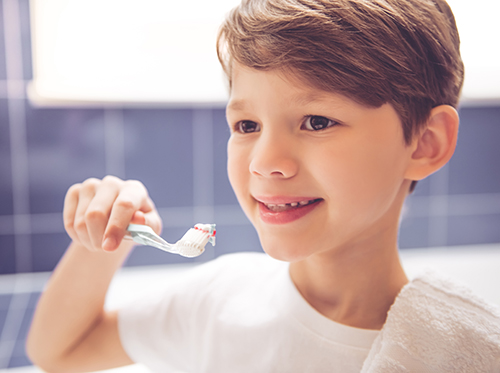
Even before a baby is born, those tiny baby teeth are already forming. Expectant mothers can help ensure that their children’s baby teeth will be strong and healthy by getting the recommended amounts of proteins, vitamins, and minerals in their prenatal diets.
But a mother can’t “eat for two” to make sure her child’s adult teeth are healthy—children’s permanent teeth begin real growth and development only after birth. What can we do to encourage strong permanent teeth as our children grow and develop? Here are four important building blocks parents can use to lay a healthy foundation for their children’s grown-up smiles.
Serve a Tooth-Healthy Diet
The same vitamins and minerals that help create baby teeth are essential for creating healthy adult teeth. Tooth enamel, the hardest substance in the body, is almost completely made up of calcium phosphate minerals. A diet which provides the recommended amounts of calcium and phosphorus helps your child’s body grow strong enamel. And don’t forget vitamin D, which our bodies need to absorb calcium and phosphorus.
A tooth-healthy diet should include several servings of foods which provide calcium, such as dairy products (milk, yogurt, cheese), dark leafy vegetables, and fortified juices, cereals and tofu. Phosphorus can be found in proteins like meat, fish, and poultry, as well as beans, nuts, dairy, and whole grains. Egg yolks and fatty fish are natural sources of vitamin D, and it’s easily available in fortified foods such as cow’s milk, soy milk, cereals, and orange juice.
Use the Right Amount of Fluoride
Fluoride is called “Nature’s cavity fighter” for a reason. Fluoride reduces the risk of cavities and helps strengthen tooth enamel. Dr. Dinah Abioro can offer invaluable advice on when to start and how to use fluoride toothpaste to protect your child’s baby teeth and developing adult teeth.
Can there be too much of this good thing? While fluoride is a safe and effective way to protect teeth in normal, recommended amounts, too much fluoride can lead to fluorosis. This condition can cause cosmetic changes in the enamel of permanent teeth, from almost invisible lighter spots to darker spots and streaking.
How to make sure your child gets the right amount of fluoride?
For children under the age of three, use a dab of toothpaste no larger than a grain of rice. Ask Dr. Dinah Abioro if fluoride toothpaste is recommended.
Young children can’t always understand the idea of spitting and rinsing after brushing, so children between the ages of three and six should use only a pea-sized dab of fluoride toothpaste, and need you there to make sure they spit and rinse afterward.
Ask us about local water fluoride levels if you have any concerns about using tap water for drinking or for mixing formula, keep fluoride toothpastes and other products out of the reach of children, monitor your children while they brush, and always check with us before giving your child a fluoride rinse or supplement.
Help Your Child Retire Harmful Thumb Sucking and Pacifier Habits
Your child might self-comfort with the help of a pacifier or thumb sucking, which can be a valuable soothing habit. But it’s important to talk to Dr. Dinah Abioro to see just how long this soothing habit should last. Around the age of four, aggressive thumb or pacifier sucking can lead to problems for permanent teeth.
Vigorous sucking can cause protruding upper front teeth. Aggressive sucking can lead to changes in the shape of your child’s palate and jaw. Open bite malocclusions, where the upper and lower teeth are unable to meet, and overbites, where the upper teeth overlap the lower teeth more than they should, can also be the result of lengthy and forceful thumb sucking.
Take Care of Baby Teeth
Baby teeth are important! They bite and chew food, and they work with the tongue to help your child learn to pronounce words properly. And there’s one more important reason to make sure primary teeth stay healthy: they serve as the place holders which guide permanent teeth into their proper spots.
When a baby tooth is lost too early, due to decay or injury, the teeth on either side can drift into the empty space, preventing a permanent tooth from erupting where it needs to. Any misalignment or crowding which results may require orthodontic treatment in the future.
Call our Bowie office if your child unexpectedly loses a baby tooth. There may be no cause for concern, or, if there’s a potential problem, an appliance called a “space maintainer,” which keeps the baby teeth from shifting out of place, can be fabricated especially for your child.
Your child’s adult teeth are being formed now. Work with us to make sure the building blocks of present and future dental health are in place. You’re giving your child the foundation for a lifetime of beautiful, grown-up smiles!









